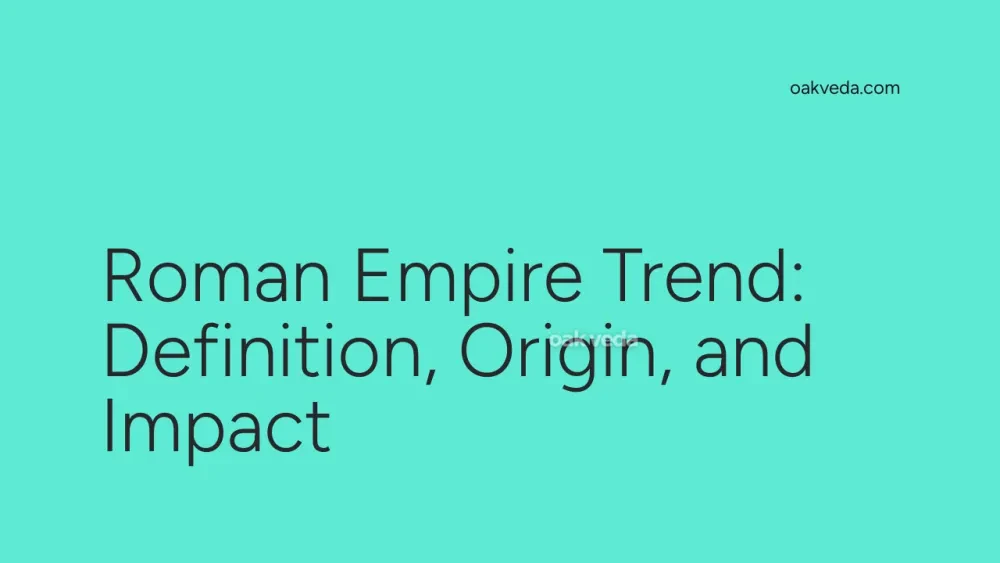
What is the Roman Empire Trend?
The Roman Empire trend is a viral social media phenomenon that originated in 2023. It began as a simple question: "How often do you think about the Roman Empire?" This query, initially directed at male partners, quickly evolved into a broader cultural touchstone. The trend has since expanded to encompass the phrase "This is my Roman Empire," which people use to describe topics, interests, or obsessions that frequently occupy their thoughts.
Origin and Development of the Roman Empire Trend
The trend's genesis can be traced back to Swedish influencer Saskia Cort, who encouraged her followers to ask their male partners about the frequency of their thoughts on the Roman Empire. This seemingly innocuous question struck a chord with social media users, particularly in North America.
The trend gained significant traction when Instagram user @gaiusflavius shared a Reel promoting the question. From there, it rapidly spread to other platforms, notably X (formerly Twitter) and TikTok, where it truly went viral. As the trend grew, it spawned a related phenomenon known as "My Roman Empire."
How the Roman Empire Trend Works
The Roman Empire trend operates on two main levels:
-
The Original Question: Users ask their partners, friends, or followers, "How often do you think about the Roman Empire?" The responses often reveal surprising insights into people's thought patterns and interests.
-
"My Roman Empire": This extension of the trend involves people sharing their personal "Roman Empires" – topics or interests they frequently think about, often to an obsessive degree.
Popular Examples of the Roman Empire Trend
The trend has produced numerous memorable examples across social media platforms:
- A user might declare a specific Timothée Chalamet SNL skit as their "Roman Empire," indicating it's something they think about frequently.
- Another person might reference a niche storyline from the TV show "Sex and the City" as their Roman Empire.
- Some users have shared more academic or historical interests as their Roman Empires, such as specific historical events or scientific concepts.
Impact of the Roman Empire Trend on Social Media Culture
The Roman Empire trend has had several notable impacts on social media culture:
-
Encouraging Self-Reflection: It prompts users to consider their thought patterns and interests, often leading to surprising self-discoveries.
-
Fostering Community: The trend has created communities of people who share similar "Roman Empires," leading to new connections and conversations.
-
Meme Generation: It has spawned countless memes and variations, contributing to the ever-evolving landscape of internet culture.
-
Gender Discussions: The initial focus on male partners' thoughts has led to discussions about gendered interests and stereotypes.
How Brands and Influencers Use the Roman Empire Trend
Savvy brands and influencers have capitalized on the Roman Empire trend in various ways:
- Content Creation: Many have produced content asking their audiences about their "Roman Empires" or sharing their own.
- Engagement Boosting: The trend serves as an excellent tool for increasing audience engagement through questions and discussions.
- Product Tie-Ins: Some brands have cleverly linked their products or services to the concept of a "Roman Empire."
- Meme Marketing: The trend has been incorporated into meme marketing strategies, helping brands appear more relatable and current.
Future Trends Related to the Roman Empire Trend
While the Roman Empire trend may eventually fade, its impact on social media culture is likely to persist:
-
Evolution of the Concept: The idea of a personal "Roman Empire" may continue to evolve, becoming shorthand for any frequently contemplated topic.
-
Inspiration for New Trends: This trend could inspire similar questions or prompts designed to spark self-reflection and community engagement.
-
Academic Interest: The trend's virality and cultural impact may become a subject of study in fields like sociology and digital media.
-
Long-Term Meme Status: "Roman Empire" could become a long-lasting meme, referenced long after the initial trend has passed.
FAQs about the Roman Empire Trend
Q: Why did the Roman Empire trend go viral? A: The trend's success can be attributed to its simplicity, relatability, and the surprising insights it often reveals about people's thought patterns.
Q: Is the Roman Empire trend only for history buffs? A: No, the trend has expanded far beyond historical interests. Anyone can participate by sharing their frequently contemplated topics or interests.
Q: How has the trend impacted discussions about gender? A: The trend's initial focus on male partners led to discussions about gendered interests and stereotypes, prompting broader conversations about gender in social media trends.
Q: Can businesses effectively use the Roman Empire trend? A: Yes, many businesses have successfully incorporated the trend into their social media strategies, using it for engagement, content creation, and even product marketing.
Q: What makes a good "Roman Empire" in the context of this trend? A: A good "Roman Empire" is typically a specific, often niche interest or topic that a person thinks about frequently or obsessively. It can be serious or humorous, ranging from historical events to pop culture references.
In conclusion, the Roman Empire trend has become a fascinating example of how a simple question can evolve into a complex social media phenomenon. It has encouraged self-reflection, fostered community building, and provided a new framework for discussing our interests and obsessions. As social media continues to evolve, the legacy of the Roman Empire trend serves as a reminder of the power of relatable, thought-provoking content in the digital age.
You may be interested in:
- Gatekeeping: Definition, Origin, and Impact on Social Media
- RN: Definition, Origin, and Impact on Social Media
- Webinar: Definition, Origin, and Impact on Digital Communication
- Gucci: Definition, Origin, and Impact in Social Media Slang
- Lemon8: Definition, Origin, and Impact on Social Media
- KPIs in Social Media: Definition, Origin, and Impact

